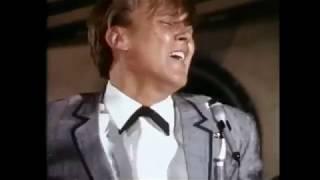Wiki: Josef Locke was the stage name of Joseph McLaughlin (23 March 1917 -- 15 October 1999), an Irish tenor singer who was successful in the United Kingdom and Ireland in the 1940s and 1950s.
Born in Derry, Ireland, he was the son of a butcher and cattle dealer, and one of nine children. He started singing in local churches in the Bogside at the age of seven, and as a teenager added two years to his age in order to enlist in the Irish Guards, later serving abroad with the Palestine Police Force, before returning in the late 1930s to join the Royal Ulster Constabulary. Known as The Singing Bobby, he became a local celebrity before starting to work the UK variety circuit, where he played 19 seasons in the northern English seaside resort of Blackpool. The renowned Irish tenor John McCormack (1884--1945) advised him that his voice was better suited to a lighter repertoire than the operatic one he had in mind, and urged him to find an agent—thus he found the noted impresario Jack Hylton (1892--1965) who booked him, but couldn't fit his full name on the bill, thus Joseph McLaughlin became Josef Locke.
He made his first radio broadcast in 1949, and subsequently appeared on TV programmes such as Rooftop Rendezvous, Top of the Town, All-star Bill and The Frankie Howerd Show. He was signed to the Columbia label in 1947, and his first releases were the two Italian songs "Santa Lucia" and "Come Back to Sorrento".
In 1947, too, Locke released "Hear My Song, Violetta", which became forever associated with him. His other songs were mostly a mixture of Irish ballads such as "I'll Take You Home Again Kathleen", "Dear Old Donegal", "Galway Bay" and "The Isle of Innisfree" (the theme song from the film The Quiet Man), excerpts from operettas including "The Drinking song", "My Heart and I", and "Goodbye", along with familiar Italian favourites such as "Come Back to Sorrento" and "Cara Mia".
In 1958, after he had appeared in five Royal Variety Performances, and while he was still at the peak of his career, the British tax authorities began to make substantial demands that Locke declined to meet. Eventually he fled the country for Ireland, where he lay low for several years. When his differences with the tax people were eventually settled, Locke retired to Co. Kildare, emerging for the occasional charity concert and reappearing in Blackpool in 1968. He appeared in front of The Prince and Princess of Wales at the 1992 Royal Variety Show, singing "Goodbye", having announced prior to the song that this would be his final public appearance.
Born in Derry, Ireland, he was the son of a butcher and cattle dealer, and one of nine children. He started singing in local churches in the Bogside at the age of seven, and as a teenager added two years to his age in order to enlist in the Irish Guards, later serving abroad with the Palestine Police Force, before returning in the late 1930s to join the Royal Ulster Constabulary. Known as The Singing Bobby, he became a local celebrity before starting to work the UK variety circuit, where he played 19 seasons in the northern English seaside resort of Blackpool. The renowned Irish tenor John McCormack (1884--1945) advised him that his voice was better suited to a lighter repertoire than the operatic one he had in mind, and urged him to find an agent—thus he found the noted impresario Jack Hylton (1892--1965) who booked him, but couldn't fit his full name on the bill, thus Joseph McLaughlin became Josef Locke.
He made his first radio broadcast in 1949, and subsequently appeared on TV programmes such as Rooftop Rendezvous, Top of the Town, All-star Bill and The Frankie Howerd Show. He was signed to the Columbia label in 1947, and his first releases were the two Italian songs "Santa Lucia" and "Come Back to Sorrento".
In 1947, too, Locke released "Hear My Song, Violetta", which became forever associated with him. His other songs were mostly a mixture of Irish ballads such as "I'll Take You Home Again Kathleen", "Dear Old Donegal", "Galway Bay" and "The Isle of Innisfree" (the theme song from the film The Quiet Man), excerpts from operettas including "The Drinking song", "My Heart and I", and "Goodbye", along with familiar Italian favourites such as "Come Back to Sorrento" and "Cara Mia".
In 1958, after he had appeared in five Royal Variety Performances, and while he was still at the peak of his career, the British tax authorities began to make substantial demands that Locke declined to meet. Eventually he fled the country for Ireland, where he lay low for several years. When his differences with the tax people were eventually settled, Locke retired to Co. Kildare, emerging for the occasional charity concert and reappearing in Blackpool in 1968. He appeared in front of The Prince and Princess of Wales at the 1992 Royal Variety Show, singing "Goodbye", having announced prior to the song that this would be his final public appearance.
- Category
- Oldies
Sign in or sign up to post comments.
Be the first to comment


